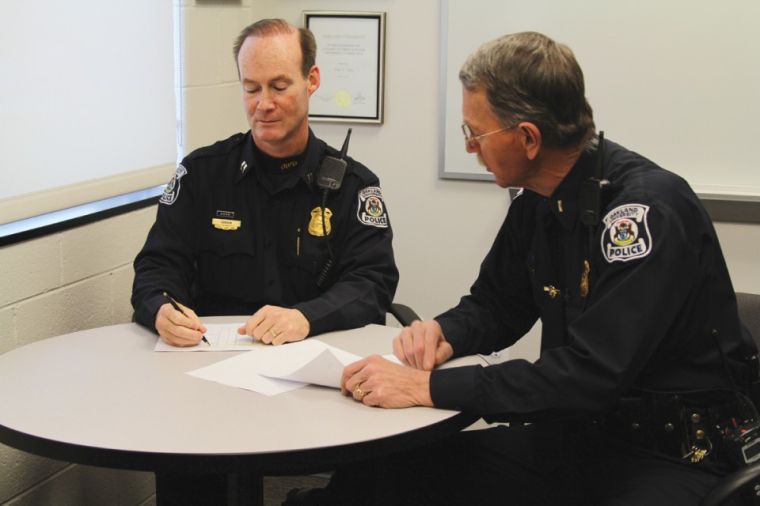The ‘inside and outside guys’ of OUPD
When you think of the Oakland University Police Department, you probably think of gold and black patrol cars, parking tickets and the station that sits next to the traffic circle off University drive.
What probably doesn’t come to mind is embezzlement, bomb threats, dangerous people on campus who aren’t students and domestic fights.
Under Chief Sam Lucido in the OUPD, you’ve got your “inside and outside guys” who deal with all of these issues as they arise on a regular basis.
Captain Mark Gordon is in charge of most of the administrative functions as well as the information technology part of the department — the “inside guy.”
Gordon works on cameras, alarm systems, policies, budgets, general orders, citizen complaints and grants. He also lines up all of the training for the department.
Then there’s Lieutenant Mel Gilroy. He is in charge of operations, meaning patrol and investigations; he is the “outside guy.” All of the personnel who patrol the streets on campus are under his authority.
Gilroy patrols, responds to calls, investigates crimes and pursues court cases. And recently, he spent somewhere between 200 and 300 hours in a financial fraud investigation a few summers back.
“You name it, we’ve had it,” Gilroy said. “I’ve been here almost 40 years, and I’ve seen it all.”
But, the jobs these men signed up for may not be exactly what you would expect inside a campus police department.
Both men, every day, must take care of day-to-day duties and responsibilities, but must also make time for other projects they constantly update and keep in motion.
Gordon is currently working on orchestrating the installation of cameras on campus, which is a $1 million project and very much on-going. After Gordon arrives at the station, checks in with the chief and takes care of his numerous day-to-day responsibilities, he can resume work on one of the continuing projects, like the cameras, that seem to require constant attention.
But every day, nine hours has the great potential to fly right by, Gordon said. Sometimes it is difficult to get the every day things taken care of in that amount of time, let alone carve out special time to get to projects.
But both men have acknowledged that their jobs are unpredictable, but even though Gordon says it can be hard to get things done, it’s how he prefers it.
He said their jobs cannot really be lumped in with the average 8-to-5 job. The two men don’t have the luxury of coming in every day and tackling whatever task is in front of them, or begins at 8 a.m.
They have three eight-hour shifts that cover a 24-hour day to worry about. They may come in during the 8-5 day shift, but often they must take care of all of the events that happened in the previous 16 hours.
And many times, much of what happens in one shift simply must be taken care of during their day shift, like processing and arraigning prisoners, and warrant requests for arrestees. This is because courts are only open during normal business hours.
“There isn’t an average day,” Gordon said. “It just depends on who comes to work and what happened on the shift before.”
He has to make decisions on things like prisoners who have been arraigned or on bond and if they need to be set free. He also has to process evidence from crimes and confiscation, as well as take care of his daily tasks, like the three projects he’s currently working on.
You wouldn’t expect these men to wear so many different hats, as Gilroy calls the vast responsibilities he’s taken.
Outside of his job at OUPD, Gilroy also puts to use his concentration in 20th century Chinese politics in his bachelor’s in history from OU. He is involved in the start of a multi-cultural center at OU and is the special assistant to the Dean for Chinese studies in the College of Arts and Sciences.
Gordon entertains the same role of different hat-wearing, but his interchanging happens inside the department. With the amount of responsibilities that come with being the head of the training department, it seems like a job in and of itself. He trains in first aid and CPR, firearms including handguns, shotguns and rifles, defensive tactics, legal update classes, and in-service training for police officers who want to go through individual training. He gets submitted the training requests and must verify there is funding available and he must make sure the schedule allows.
Their responsibilities may be completely opposite when they walk through the doors each morning, but they know their job couldn’t exist without the other. And everything they do is to keep the campus, and the people on it, safe.
“While our day-to-day tasks are different, our objectives, our mission, our duties are the same,” Gilroy said.
Combined, their goal is to reduce serious crime on campus and maintain a good, strong relationship with the community








